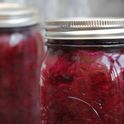home made yoghurt-- to strain, or not to strain?
i've been using a couple tablespoons commercial yoghurt (live cultures) as a starter, with ~pint of flash-pasteurized farmer's market whole milk, then following directions i found online. final product is very smooth and runny, tasty. tried straining overnight for first time, woke up just now to a tiny fraction of the volume i started with! saved filtrate in a container under the strainer, it looks like the cloudy, yellow, watery stuff i usually pour off the top of yoghurt. any other pros/cons to straining besides losing so much volume (hence $)? nutrient lost? not sure straining is worth it! thanks.
13 Comments
http://phickle.com/index.php/fermentation-basics-ginger-beer/
Just skip the part about the starter and sub 1 cup of whey for the ingredient "ginger beer starter."
There are lots of ginger beer recipes out there. Go nuts! And yes, whey is so super versatile: bread-making liquid, salad dressing, soups, stews, smoothies, I could go on and on. When I have way too much, I use it, diluted, on my tomato plants to combat late blight.
:-)
http://wp.me/p27pPl-5R
And you honestly don't have to use a yogurt maker, though I now use one which produces up to 2 wonderful quarts of the stuff. For years, and I mean literally years, I was quite content to make it in a quart-size Mason jar wrapped in a heating pad set on Low and secured with rubber bands. Persevere!
http://www.amazon.com/Yogourmet...
Whether or not you strain is a personal preference. If you enjoy a more liquid style yogurt then, by all means, don't strain! I find that the consistency I choose depends on what I am using the yogurt with (dessert? --> thicker, sauce? --> thinner).
On point to make, you could use a finer textured cloth to strain your yogurt to result in a consistency that is in between the liquid-style and thick-style (aka "Greek").





